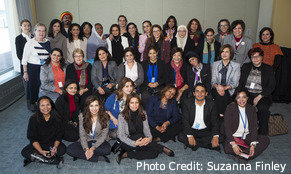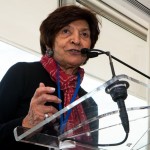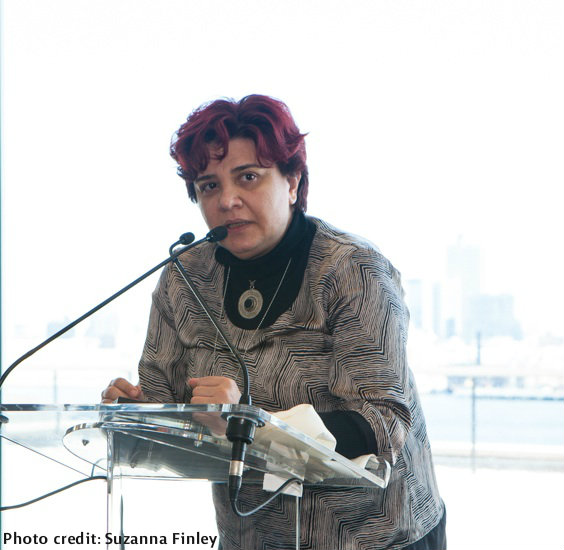Karama Partners Advocate for Accountability and Inclusion at the 58th Session of the UN CSW
Posted on: March 28, 2014, by : Editor Thirty-five women’s rights activists representing eight countries in the region, including Egypt, Lebanon, Libya, Morocco, Somalia, Sudan, Syria, and Yemen participated at the 58th Session of the United Nations Commission on the Status of Women in New York from March 10th-14th, promoting women’s inclusion and equal role at all levels of decision making, and at all points of the peace making and transition processes.
Thirty-five women’s rights activists representing eight countries in the region, including Egypt, Lebanon, Libya, Morocco, Somalia, Sudan, Syria, and Yemen participated at the 58th Session of the United Nations Commission on the Status of Women in New York from March 10th-14th, promoting women’s inclusion and equal role at all levels of decision making, and at all points of the peace making and transition processes.
Building upon earlier years of advocacy, this year’s Karama delegation focused on engaging the CSW itself, setting meetings with their government missions, official delegations, and special rapporteurs dealing with violence and related issues, including trafficking in women. The week included a series of panels, dialogues, and high-level meetings where Karama’s partners raised awareness of the situation for women in their home countries, and issued calls to action, identifying strategies and illuminating challenges with regard to ongoing transitions and with the struggle to ensure women’s equal position in governments, constitutions, and societies.
While some international decision makers are crediting 2013 as an incredible year for women, peace, and security, many in the region feel differently. Despite rising awareness of violence against women in the region, including particularly egregious assaults committed during times of conflict, action to implement instrumental documents such as UN Security Council Resolution 1325 with regard to women, peace, and security has been slow.
At the March 11th panel on implementing women, peace, and security, hosted by the International Alliance of Women and co-sponsored by Karama, Yemeni activist and Karama partner Amal Basha shared concrete examples on how to utilize international conventions and agreements, citing how they leveraged such documents to gain not only women’s representation in the National Dialogue Conference, but also in the outcome document the committee adopted at its conclusion advocating for a thirty percent quota for women’s inclusion in Yemen’s national assembly.

At the interactive panel on the challenges and achievements in the implementation of the Millennium Development Goals for women and girls held on March 12th, Dr. Fatemah Khafagy, Ombudsperson for Gender Equality in Egypt, stressed, “Financing for gender equality at the international level is very important.” She also spoke to the need for greater accountability of governments. “An agency like the national machinery for women should be supported technically and financially to monitor the implementation of MDG3 and gender mainstreaming in all other MDG goals.”
Throughout the discussions and meetings at the CSW, there appears to be a clear consensus that while the Millennium Development Goals and MDG3 in particular, originally adopted in 2000, did a good job of drawing broad global commitments and bringing attention to key development areas, they failed to adapt to country-specific situations and were defined by indicators that did not amply address the systematic and complex causes of gender inequality and violence against women. Moreover, without international and national structures to monitor implementation, they failed to be useful national policy making tools.
On Thursday, an NGO-government dialogue, co-sponsored by the Mission of Iraq, CRTD, the NGO CSW Forum, and Karama, dove further into the gaps left by the MDGs and looked forward to the post-2015 agenda and Beijing+20. Karama delegates Dr. Hoda Badran (Chair of the Egyptian Feminist Union and Alliance for Arab Women), Fatima Outaleb (Union de l’Action Feminine, Morocco), and Ghida Anani (ABAAD Gender Equality Resource Center, Lebanon) participated in the discussion.
Dr. Badran shared that studies have estimated the cost of the violence for the Arab region is more than 450 million USD over the past three years and women’s unemployment has increased about two percent in the last two years. “Life expectancy has increased for women,” she said. “But the question is, what kind of life?”
There is a lot at stake for women in the region, and they need to be engaged and included in order to influence national action plans and international standards set for measuring their progress. Ghida Anani called for “a comparative approach between goals set and what resources are needed to make these changes happen,” emphasizing accountability and political will as key elements of galvanizing tangible reforms.
 A key takeway point from this year’s delegation was the importance of partnership across diverse groups of stakeholders. From a panel discussing outreach to religious leaders and to men as allies in making the case for gender equality and ending cycles of violence to sessions engaging governments and NGOs together to analyze the way forward, it is clear that the only way to fill in the gaps faced by women in the region and across the globe is to work together, across differences, and find mutual areas of agreement and priority. “Civil society is not consulted enough in shaping the MDGs or other conventions,” Fatima Outaleb said. “Our voices need to be included in the next development agenda. “We are partners for change and we need each other.”
A key takeway point from this year’s delegation was the importance of partnership across diverse groups of stakeholders. From a panel discussing outreach to religious leaders and to men as allies in making the case for gender equality and ending cycles of violence to sessions engaging governments and NGOs together to analyze the way forward, it is clear that the only way to fill in the gaps faced by women in the region and across the globe is to work together, across differences, and find mutual areas of agreement and priority. “Civil society is not consulted enough in shaping the MDGs or other conventions,” Fatima Outaleb said. “Our voices need to be included in the next development agenda. “We are partners for change and we need each other.”
The 58th Session of the Commission on the Status of Women convenes policymakers, activists, government representatives, and UN officials to examine the priority theme of challenges and achievements in the implementation of the Millennium Development Goals (MDGs) for women and girls. The MDGs, along with other international standards, targets, and conventions on gender equality, human rights, and peace and security, are key mechanisms in the work of Karama and its partners throughout the region to lobby decision-makers and build pressure for national governments to adopt crucial reforms.
The main outcome of the two-week convening is the Agreed Conclusions. The 24-page document was adopted with the consensus of all 45 members of the CSW on March 21st, after dialogue and debate at the United Nations in the preceding days.
This year marks Karama’s eighth consecutive delegation to New York for the CSW. Past delegations have shared strategies on increasing women’s political participation, raised awareness on the situation of stateless and refugee women and their families, and identified priorities for women on the ground as Arab States begin their transitions from old dictatorships to new governments.
For more information about Karama’s delegation, please contact Avni Shah at avni@el-karama.org.
